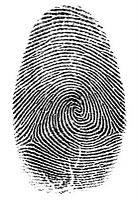I have had some interesting comments on my blog of late, usually positive which is nice. There has been a bit of a trend saying that my ultramarathon posts are good for general stuff and especially for beginner ultrarunners. I actually make a point of keeping my posts as generic as possible (trying to please all of the runners all of the time). I also do not like to go into too much detail on specific training techniques, and the reason for this is quite simple (and a long running theme of this blog).
 We are all different. How our bodies and minds react to changes in temperature, humidity, ground conditions, dehydration, nausea, etc , are all as unique as your fingerprints. So to suggest that a particular ultramarathon training program or hydration strategy that as a “one size fits all” solution would be foolish and possibly a little irresponsible.
We are all different. How our bodies and minds react to changes in temperature, humidity, ground conditions, dehydration, nausea, etc , are all as unique as your fingerprints. So to suggest that a particular ultramarathon training program or hydration strategy that as a “one size fits all” solution would be foolish and possibly a little irresponsible.I was in contact with another runner the other day, Campbell, who was asking where he could find some good training plans and literature to guide his training. I gave him a couple of good sources of information, but did stress this uniqueness of our responses to training. I also gave a very high level weekly ultra training regime that I loosely follow of the LSD run on the weekend, and then a couple of strength sessions (hills, stairs, and sprint intervals) and a tempo or fartlek or just a relaxing jog. You just change the intensity of each type of session dependent on the timing for your next race (and how you’re feeling).
I also suggested a monthly time trial run to track your training progress, strengths and weaknesses. Then to keep a detailed log book to establish what you need to change and what has worked for you before. This log book will become your personal bible, a blueprint of your running life. The more variety you put into your training, the better informed you will be of how you response to different conditions. It’s worth noting in your log anything outside your running life that could influence your performance. Things like poor sleep, stress at work, any illness, and so on.

When you have a good history in your log, it can become an invaluable resource to understand all number of situations such as what tapering regime works best for you, and how you recover most effectively. Most importantly for me, it becomes a source of motivation. Not only do you see all the miles you have run, but also how far you have come in terms of your physical and mental capability. It can bring you out of a training rut, help you avoid injury and make you want to get out of bed at 4:30am to get in a good run before work.
What you have is a runners user manual written specifically for you – and that’s something you can’t buy in a book store or find through Google!
Happy Running!
Andy
"Those who say it can't be done are usually interrupted by others doing it."
Training 2-11-2010 (22.4km Trail)
Training 5-11-2010 (17.1km Hills session on Trail)
www.ultrarunning.com.au

